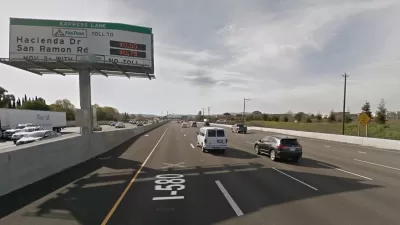Federal transportation leaders recognize that sustainable transportation funding options are needed to meet America's infrastructure needs. At AASHTO's Annual Washington Briefing, different funding strategies were proposed by key Congress members.
While Congress celebrated the passage last December of the first long-term transportation reauthorization bill since the 2005 bill, SAFETEA-LU expired in 2009, it is not resting on the funding problem. Sustainable options, rather than one-time subsidies like the $70 billion that props-up the FAST Act for five years are recognized by most to be necessary.
Four key transportation leaders from the House and Senate addressed the American Association of State Highway and Transportation Officials (AASHTO) Annual Washington Briefing on Capitol Hill held February 24 through February 26 on what they believe can fully fund transportation spending.
Rep. Sam Graves, R-Mo., chairman of the House House Transportation and Infrastructure Subcommittee on Highways and Transit, "made clear that he thinks the effort will eventually move toward VMT (vehicle-miles-traveled) pricing," writes the AASHTO Journal editor, commonly known as a VMT fee, road usage charge, or mileage-based user fee.
Graves said lawmakers should be able to agree on a funding solution in a year or two, and "I really believe we'll end up with some form of vehicle miles traveled (fee)."
Rep. Peter DeFazio (D-Ore.), ranking member of the House Transportation and Infrastructure Committee supports a different funding option, opting for a very indirect user fee that doesn't tax gasoline but adds "an upstream wholesale tax on the portion of oil used in transportation." President Obama recently proposed a similar type of funding option, a $10-per-barrel oil fee, for his transportation budget next year.
[He] cited some difficulties with adopting a VMT-type user fee across the country, including its complexity and the privacy concerns it raises for some.
DeFazio noted that Oregon has a major VMT pricing system pilot program [sic] under way.*
One problem with the wholesale oil tax is that it misses a growing component of the motor vehicle fleet, electric vehicles (EVs). Many states are tackling that problem by charging fixed, annual EV fees. Unlike a gas tax, there would be no difference between some driving a 1,000 miles a year, or 10,000 miles a year.
Four videos (click on Congress member or Senator) are available of the presentations to the AASHTO Annual Washington Briefing:
- Sen. Jim Inhofe, (R-Okla.) Chairman of the Senate Environment and Public Works Committee
- Senate Environment and Public Works Committee Ranking Member, Sen. Barbara Boxer (D-Calif.)
- Rep. Peter DeFazio, (D-Ore.) Ranking Member of the House Transportation and Infrastructure Committee
- Rep. Sam Graves, (R-Mo.) Chairman, of the House T&I Subcommittee on Highways and Transit
The T&I Committee will likely look for reports from the states on the VMT programs. For states considering embarking on their own mileage fee programs, "the FAST Act establishes the Surface Transportation System Funding Alternatives program, which provides up to $95 million to enable States to test and demonstrate innovative methods to fund needed infrastructure improvements," according to a January post.
*Correspondent's note: Oregon's pricing program, known a OReGO, is not a pilot—it's the real deal. ODOT already ran two pilot programs in 2007 and 2013. The new program is limited to 5,000 volunteers though. It will run until legislation ends it, unlike a pilot program which has a set termination date, such as the 9-month California Road Charge Pilot Program to begin in July.
FULL STORY: House T&I Leaders Say Panel Will Soon Begin Exploring Sustainable Funding Options

Planetizen Federal Action Tracker
A weekly monitor of how Trump’s orders and actions are impacting planners and planning in America.

Congressman Proposes Bill to Rename DC Metro “Trump Train”
The Make Autorail Great Again Act would withhold federal funding to the system until the Washington Metropolitan Area Transit Authority (WMATA), rebrands as the Washington Metropolitan Authority for Greater Access (WMAGA).

DARTSpace Platform Streamlines Dallas TOD Application Process
The Dallas transit agency hopes a shorter permitting timeline will boost transit-oriented development around rail stations.

LA County Creating Action Plan to Tackle Extreme Heat
Los Angeles County is creating a Heat Action Plan to help communities stay safe during extreme heat, with steps like adding more shade, improving buildings, and supporting the neighborhoods most at risk.

Maryland Plans Quick-Build Complete Streets Projects
The state will use low-cost interventions to improve road safety in five Maryland counties.

Downtown Los Angeles Gears Up for Growth
A new report highlights Downtown L.A.’s ongoing revival through major housing projects, adaptive reuse, hospitality growth, and preparations for global events in the years ahead.
Urban Design for Planners 1: Software Tools
This six-course series explores essential urban design concepts using open source software and equips planners with the tools they need to participate fully in the urban design process.
Planning for Universal Design
Learn the tools for implementing Universal Design in planning regulations.
City of Charlotte
Municipality of Princeton
Roanoke Valley-Alleghany Regional Commission
City of Camden Redevelopment Agency
City of Astoria
Transportation Research & Education Center (TREC) at Portland State University
US High Speed Rail Association
City of Camden Redevelopment Agency
Municipality of Princeton (NJ)



























